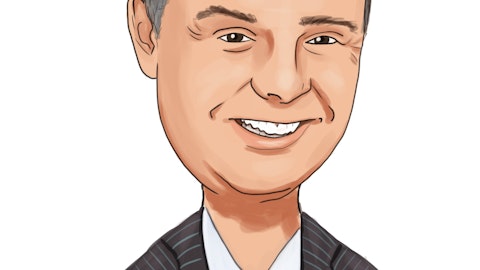Byline Bancorp, Inc. (NYSE:BY) Q2 2023 Earnings Call Transcript July 29, 2023
Operator: Good morning, and welcome to the Byline Bancorp Second Quarter 2023 Earnings Call. My name is Glenn and I’ll be your commerce operator today. [Operator Instructions] Please note the conference call is being recorded. At this time, I would like to introduce Brooks Rennie, Head of Investor Relations for Byline Bancorp to begin the conference call.
Brooks Rennie: Thank you, Glenn. Good morning, everyone. And thank you for joining us today for the Byline Bancorp second quarter 2023 earnings call. In accordance with regulation FD, this call is being recorded and is available via webcast on our Investor Relations website along with our earnings release and the corresponding presentation slides. Management would like to remind everyone that certain statements made on today’s call involve projections or other forward-looking statements regarding future events or the future financial performance of the company. We caution that such statements are subject to certain risks, uncertainties and other factors that could cause actual results to differ materially from those discussed.
The company’s risk factors are disclosed and discussed in its SEC filings. In addition, certain slides contain and we may refer to non-GAAP measures, which are intended to supplement, but not substitute for the most directly comparable GAAP measures. Reconciliation for these numbers can be found within the appendix of the earnings release. For additional information about risks and uncertainties, please see the forward-looking statement and non-GAAP financial measures disclosures in the earnings release. I would now like to turn the conference call over to Alberto Paracchini, President of Byline Bancorp.
Alberto Paracchini: Thank you, Brooks, and good morning, everyone. We appreciate you taking the time to join the call this morning to review our second quarter results. The deck we will be referencing can be found on our website. Please refer to the disclaimer at the front. Joining me on the call this morning, our Chairman and CEO, Roberto Herencia; our CFO and Treasurer, Tom Bell; and our Chief Credit Officer, Mark Fucinato. Before we get into the results for the quarter, I want to pass the call on to Roberto for a few items. Roberto?
Roberto Herencia: Thank you, Alberto, and good morning, everyone. Before Alberto and the team go over the strong results for the second quarter and answer your questions, I wanted to highlight an important milestone in our story. At the end of June, we marked the 10-year anniversary of the recapitalization of the Metropolitan Bank Group, MBG, which, as you know, we renamed shortly thereafter, Byline. At the time, the $200 million-plus recapitalization was the largest recap of a bank in Chicago in over 25 years. What has been accomplished in our 10 years is remarkable and a true story of transformation. Looking back to March of 2013, the quarter before we closed the recap, MBG had 12 bank charters, 88 branches and total assets of $2.4 billion.

nick-pampoukidis-t-UV1rZqPuY-unsplash
Byline, of course, has only one charter. And at the end of June, not including Inland, which, as you know, closed effective July 1 at 38 branches, 50% fewer and total assets of $7.6 billion, more than 3x. MBG had total deposits per branch of $25 million and non-interest-bearing deposits, the total deposits of 26%. Today, Byline has $153 million per branch and non-interest-bearing deposits to total deposits of 30% plus. We have a top quartile margin and better than median profitability in our peer group. Five acquisitions later, again, excluding Inland, but including the MBG recap, our Board and management team have shown their expertise in integrating and adding value post acquisitions. Growth has been evenly distributed between well-executed acquisitions and organic growth driven by talented bankers who have joined Byline amid disruption by larger bank mergers in our area.
We expect this to continue over the next five years. There are a few critical factors that have supported our success. And this is not the forum to discuss those, but the one which I firmly believe is the main driver, people. Our investment in people, our colleagues and collaborators is palpable at this organization. It shows up in our engagement surveys and our ability to continue to attract, retain and inspire talent. I cannot emphasize enough how nuanced this topic is at Byline. Being home to the best commercial bank in town in Chicago and within the line of business that we operate is hard to replicate by others, especially larger players. This has been and will continue to be the key. To which, Byline was recognized a few days ago as one of Forbes America’s Best Small Employers.
We were the only Illinois bank and one of only six Illinois companies to be recognized. This is thanks to our team members who support our customers, serve and work in our communities and continually look for ways to do better today than yesterday, and of course, our dedication and commitment to the well-being of our people. I am as confident as ever in Byline’s positioning as Chicago’s largest community bank, our ability to outperform through the cycle and to deliver products and service offerings that improve lives for all our stakeholders. As you can tell, we are optimistic about Byline. And frankly, I’m just thankful to be part of the team that will steward the bank into the future. With that, I’ll pass the call back to Alberto.
Alberto Paracchini: Great. Thank you, Roberto. And now in terms of the agenda, I’ll start by providing highlights for the quarter, followed by Tom, who will walk you through our results in more detail. After that, I’ll provide some closing comments before we open the call up for questions. At the time of our call last quarter, we were coming off a challenging period for the industry that ultimately saw the failure of three institutions and was characterized by a degree of uncertainty that shook the confidence in our system. Our priorities at the time were to remain focused on executing our strategy, capitalize on opportunities to grow relationships and hire talent. We also wanted to remain vigilant on credit and manage our capital and liquidity conservatively.
Lastly, we wanted to complete the Inland transaction. Our performance and results this past quarter show meaningful progress against those priorities. Before we jump to the highlights, let me first give you an update on the Inland transaction. As previously announced, the transaction closed effective July 1st and key milestones in the integration have been completed as planned. The bank subs have merged and former Inland employees were successfully onboarded into our systems. Our focus is now centered on integrating them into the company, our culture and their respective teams so they can get back out into the market. Up next comes the rebranding under the Byline brand and the product and systems conversion, which remain on track for completion later this quarter.
Due to the timing of the closing, the impact of the transaction on the second quarter was minor, say, for some merger-related expenses. Next quarter, aside from the usual noise from onetime charges, you will see a full quarter of consolidated results. As we disclosed in our earnings release, pro forma for the acquisition, Byline now has approximately $8.8 billion in assets, $6.4 billion in loans and $6.9 billion in deposits with 48 branch locations. Moving on to Page 3 of the deck. For the second quarter, we reported net income of $26.1 million and EPS of $0.70 per diluted share. If we adjust for merger-related charges, net income was $27.3 million or $0.73 per diluted share, both figures representing record levels for the company since going public and up 9% and 20% on a quarter-on-quarter and year-over-year basis, respectively.
Profitability and return metrics continue to remain strong across the board. ROA came in at 141 basis points, while ROTCE was 16.8%. On an adjusted basis, ROA was 148 basis points and ROTCE came in at strong 17.5%. Adjusted pre-tax pre-provision income was $42.5 million for the quarter, which put our adjusted pre-tax pre-provision ROA at 230 basis points, down 5 basis points linked quarter but up 43 basis points year-over-year. Total revenue was flat quarter-over-quarter at $90 million, but up $14.5 million or 19% over the prior year, driven by higher net interest income stemming from loan growth and higher rates. Non-interest income came in at $14.3 million, lower than last quarter as expected, but in line with the prior year. Adjusting for the impact of fair value marks on our servicing asset, non-interest income remained consistent between the quarters.
Expenses came in at $49 million, inclusive of merger-related charges. If we exclude those, expenses were well managed at $48 million. Netting these two figures translated into positive operating leverage on a year-over-year basis. Moving on to profitability. The margin remained solid at 4.32%, declining only 6 basis points from the prior quarter, notwithstanding higher funding costs. Our adjusted efficiency ratio came in at 51%, down both against the previous quarter and lower by over 350 basis points on a year-over-year basis. Moving on to the balance sheet. Loan growth moderated consistent with guidance and the portfolio stood at $5.6 billion as of quarter end. Notwithstanding the environment, this was the ninth consecutive quarter of growth in loans, and we continue to see solid levels of business activity.
Originations were solid, and we saw an uptick in payoff activity during the quarter. Results were driven largely by our commercial banking sponsor and leasing businesses. Our government-guaranteed lending business had a solid quarter with $141 million in closed loans, up from the prior quarter and 12% year-over-year. I’d like to acknowledge and give a shout out to our team who earlier this month was recognized by the SBA as the top 7(a) lender for the 14th consecutive year. We were also recognized as the top 504 and export lender in the State of Illinois for fiscal year 2022. In terms of liabilities, total deposits end of the quarter at $5.9 billion, up $104 million from the first quarter. Average deposits were also up 1.7% quarter-on-quarter, driven by flows related to new customers.
As we anticipated, this quarter, we continue to see a shift in mix, that Tom will cover in more detail shortly, towards higher-yielding products consistent with a higher rate environment. Asset quality improved with NPLs decreasing 15 basis points to 69 basis points at the end of the quarter. Credit costs were $6.5 million, inclusive of net charge-offs, which were $4.3 million or 31 basis points, and we had a net reserve bill of $2.2 million. This quarter, we took advantage of opportunities to accelerate some NPL resolutions, which drove the uptick in charge-offs. The allowance for credit losses ended the quarter at a strong 1.66% of total loans. Capital and liquidity were further bolstered this past quarter with CET1 ratio increasing by 37 basis points to 10.6%, and our total capital and TCE ratio ending the quarter at 13.5% and just under 9%, respectively.
With that, I’d like to turn over the call to Tom, who will provide you with more detail on our results.
See also 25 Countries with the Highest Income Inequality in the World and 13 Safe Stocks To Invest In.
Q&A Session
Follow Byline Bancorp Inc. (NYSE:BY)
Follow Byline Bancorp Inc. (NYSE:BY)
Receive real-time insider trading and news alerts
Thomas Bell: Thank you, Alberto, and good morning, everyone. I will start with some additional information on our loan and lease portfolio on Slide 4. Total loans and leases were $5.6 billion at June 30, an increase of $53 million from the end of the prior quarter. Net of loans sold, we originated $312 million during the quarter, an increase of 25% quarter-over-quarter. We saw increases across all our major lending areas with the strongest growth coming from commercial and leasing groups. Payoffs increased in the second quarter to $256 million compared to $231 million in the first quarter, and line utilization remained flat at 54%. Looking ahead, we continue to expect loan and lease growth to be in the mid-single digits for the remainder of this year.
Turning to Slide 5. Our government-guaranteed lending business finished the quarter with $141 million in closed loan commitments, which was higher than the first quarter and better than expectations. At June 30, the on balance sheet SBA 7(a) exposure and USDA exposure was relatively unchanged quarter-over-quarter. Our allowance for credit losses as a percentage of the unguaranteed loan balances was 9.1% as of quarter end. Turning to Slide 6. Total deposits stood at $5.9 billion, increasing 2% from the end of the prior quarter. Non-interest-bearing DDA was down $159 million – excuse me, $158 million quarter-over-quarter, driven by customers seeking higher rate options, seasonality and other business activity. DDAs continue to represent a healthy 30% of total deposits.
Commercial deposits accounted for 48% of total deposits and represents 75% of all non-interest-bearing deposits. As anticipated, we saw continued changes in mix during the quarter due to prevailing market rates, competition and higher-yielding alternatives. Deposit costs for the quarter came in at 170 basis points, an increase of 55 basis points from the prior quarter. On a cycle-to-date basis, deposit betas both for total deposits and interest-bearing deposits stood at 32% and 47%, respectively. We continue to remain focused on funding loan growth with our core deposits. In addition, the Inland Bank transaction brings approximately $705 million in core deposits to our balance sheet. Turning to Slide 7. Our net interest income was $76 million in Q2, up 1% from the prior quarter, primarily due to loan and lease growth and higher yields offsetting higher interest expense on deposits.
On a GAAP basis, our net interest margin was 4.32%, down 6 basis points from the prior quarter. Earning asset yields increased a healthy 30 basis points, driven by an increase of 35 basis points in loan yields to 7.18%. Going forward, on a standalone basis, we expect our net interest income to be flat quarter-over-quarter. And with Inland on a preliminary basis, we estimate net interest income will grow by $12 million to $14 million in Q3. Turning to Slide 8. Non-interest income stood at $14.3 million in the second quarter, down 5.6% linked quarter, primarily driven by a $865,000 negative fair market value on loan servicing assets due to an increase in prepayments, which was partially offset by an increase of $556,000 in net gain on sale of loans due to higher volumes and higher net premiums.
Sales of government guaranteed loans picked up in the second quarter by $14 million compared to the first quarter. The net average premium was 8.6% for Q2, higher than the first quarter. Our pipeline and fully funded government guaranteed loan is forecasted to be consistent with Q2 results. We expect gain on sale income in Q3 to remain consistent with what we experienced in Q2. Turning to Slide 9. Our non-interest expense was well managed and came in at $49 million in the second quarter. And on an adjusted basis, $1 million below our Q2 guidance of $49 million to $51 million. The increase was attributed to merger-related expenses and higher marketing costs due to deposit gathering initiatives. We continue to remain disciplined on expense management and are updating our guidance related to the Inland acquisition.


